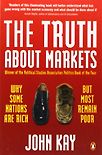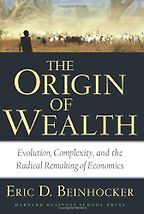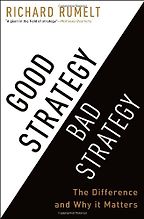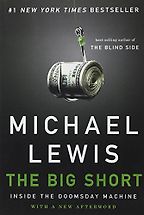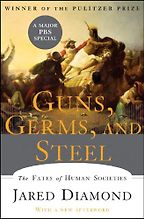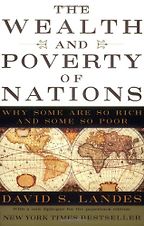You have described economics and business as the last bastions of modernism. What do you mean by that?
I think they are the last bastions of the idea that you can redesign the world in accordance with a rationally designed blueprint. Modernism in the twentieth century went through areas such as art, architecture and the humanities with the idea that we could rethink everything from the ground up and that we understood enough about the world to do that. I’ve come to believe that we don’t. But people still think they can analyse and structure economies as if they were a mechanical system and that they can do the same in business. So in the same way that Le Corbusier said – wrongly – that a house is a machine for living in, it exemplifies the idea that a business or an economy can be structured from first principles in the same way.
And ignores the social context within which economies and businesses work.
They are organic entities that evolve over time and operate within a social context. You can’t look at them independently of that.
Are the economic and financial ructions we’ve been experiencing in recent years due in part to the failure of economists and business leaders to appreciate this?
You can’t understand how the financial crisis came about without understanding the politics of the relationship between the financial sector and government and the anthropology of the cultures of these organisations, or indeed without appreciating the history of bubbles and financial crises.
Would we have better economists if universities broadened the syllabuses of their economic courses to include, say, literature, history and anthropology?
It is depressing how little outside economics most economists have read. It would be a good example in relation to my five books, in that I would guess that most people completing degrees in economics would not have read any of them and yet they would have learnt a great deal about things relevant to subjects they have been taught if they had.
Let’s take a look at your book choices. I know you described your first as the most important business book of the year in 2007 because it’s emblazoned across the front cover. Why is it so important?
It’s important because it adopts the organic, evolutionary perspective we have just been describing; it doesn’t see economics being a purely mechanical system divined by optimisation models. I rather regard it as being similar to my own book The Truth About Markets, which I was far too modest to put on my list.
This book emphasises the way that an understanding of the operation of markets has to be embedded in a social context and that complexity, agent-based modelling and evolutionary thinking are every bit as important to understanding the way economies and businesses develop as the models of the standard neo-classical paradigm of economics. What’s good about this book in particular is that he understands that these traditional paradigms of economics are not wrong, just that they are only a part of the story. And that I think is critical because there is quite a lot written that is critical of mainstream economics but it tends to be ‘all that stuff is rubbish, I have this other story about how economies work that is different and better.’ For me, that misses the point that there isn’t a single story. The way we understand economics and economies is by learning from lots of sources and thinking about them in lots of different ways.
Beinhocker talks about the paradigm shift away from traditional economics to complexity economics. What is complexity economics exactly?
It’s understanding that the economic world, like parts of the physical world, is described by non-linear dynamic systems in which outcomes are heavily influenced by quite small changes in initial conditions. So there is no equilibrium, but just constant evolution and change. The whole mathematics of complexity, which has mushroomed over the last 30 years, has been about understanding the development of these types of systems.
This book is essentially a survey of these ideas not only in economics but also physics, biology and cognitive science.
Yes it is. What’s good about it is that it is eclectic. I initially picked it up to write a review and was planning to do a hatchet job given that it had a ludicrously ambitious title and was by a McKinsey consultant. I then discovered it was actually very good.
Five Books interviews are expensive to produce. If you're enjoying this interview, please support us by donating a small amount.
I would like to touch upon the role of evolution in understanding economies and in businesses, as it features in this book and you yourself have said that the growth comes from evolution.
The development of firms and economies is fundamentally an evolutionary process that has the characteristics that evolutionary natural selection has of adaptation, replication and selection. All of these are characteristics of the way economies and businesses evolve. That doesn’t mean you do what some people have done and try quite literally to translate mathematical models developed to describe biological evolutionary processes into economic terms, but it does mean that kind of thinking and kind of mathematics is as relevant to economics as it is to biology.
You pay a great deal of attention to business strategy and point out that it is often very poor. What does this book tell us?
Most books about business strategy are indeed terrible. The great take away of this book is that good strategy is really just about structured thinking about problems. Rumelt is a brilliant expositor of how you can do that in relation to a range of business issues. In the course of doing so he pokes brilliant fun at strategy gurus and people who sit down and have visions, essentially thinking themselves effective businesses. Rumelt is someone who is a very thoughtful observer of businesses, and has been involved in many, but has never really written very much in the course of his lifetime. This book is really the accumulation of a lifetime’s thinking.
So, what’s at the heart of a good business strategy?
At the heart of a good strategy is organised thought about your business, what its competitive advantages are, and how they relate to the markets in which you operate or might operate in. This book is full of lovely vignettes. One of my favourites – which I can relate to from my own experiences – is when he was in discussion with an investment banker about a proposed merger and describes brilliantly the fundamental pretentious vacuity of the banker who just wants to do the deal. The discussion ended when the two of them agreed that they simply couldn’t communicate with each other.
Your next book is authored by the journalist Michael Lewis who has form writing about finance, as he penned the terrific Liar’s Poker about Wall Street in the 1980s. This book looks at the people who actually made money in the 2007/2008 financial crash.
Lewis is a great writer and this is one of the best accounts of what happened in the run up to the crash. In fact, I just recommended it to someone I was with last night who was talking about the efficient market hypothesis – which is the basic paradigm of financial economics – and I told him that if he wanted to understand why it didn’t apply in the run up to the financial crisis, he needed to go away and read this book. In it, Lewis talks about the bankers who knew early on that what was happening was nonsense and was all going to end in tears and how they translated that insight into money making strategies.
What does it tell us about group think in financial markets and the characters of people who decide to go against the tide and bet against accepted wisdom?
It tells us the difficulty markets have in correcting group think. You really have to be quite Aspergerish to take a stand against the crowd. In fact one of Lewis’s heroes, as it were, is hedge fund manager Michael Burry, who clearly had serious socialisation problems.
He also mentions the analyst Meredith Whitney, who made her name by taking a very bearish view of the banks just before the crisis began. Today, her reputation is looking rather less stellar after predicting an avalanche of US municipal bankruptcies which have failed to materialise. It does suggest that good luck and timing have a significant role in the making of so-called financial geniuses.
Yes it does. The hedge fund manager John Paulson, who made serious money out of the financial crisis, has lost quite a lot of money in subsequent bets since then which raises questions as to what extent he was just lucky to get that particular call right or whether hubris has made him over confident as a result of having got that one right.
I love Michael Lewis’s earlier books. Is this one as readable as they are?
It’s really readable. What Lewis does so well is give the reader a lot of fun while actually making a number of serious points. You can pretty well read this book on the beach for amusement, but there is a point there.
I believe it might hit the big screen. Brad Pitt has apparently bought the film rights.
That makes sense as Brad Pitt starred in the film version of Lewis’s book Moneyball. He must have connected with Lewis in some way.
Tell us about your next author.
He’s an anthropologist writing about economic history in a big picture way.
This book looks at why history unfolded in certain ways in certain continents.
Yes, and he explains the interaction of geography and science with economic development. He starts with what he called the Yali’s question, when a Papua New Guinean man asks him: ‘Why do you have so much stuff to bring to us, and we don’t have the equivalent amount of stuff to bring to you?’ Behind this question lay a bigger one: Why has there been greater economic development in Western Europe than in other parts of the world? Diamond traces his answer over 13,000 years, through the development of agriculture and the particular places that were conducive for the development of crops and domestic animals that became critical to economic development.
Diamond disregards race as a determinant of economic development and says it’s to do with geography and bio-geography, pointing to the early demise of hunter gathering in Europe and its replacement by the herding of animals and development of settlements, which went on to spur further economic development.
You also had the crops in Europe that allowed for the development of agriculture. Equally there’s the oddity he describes of the geography of Eurasia running east-west, so you don’t get huge differences in climate which allowed for innovations to be easily transmitted. If you are brought up with the rationalist tradition of standard economics, you just never make the sorts of connections that Diamond makes.
What does this book say about the modern world?
It’s about understanding how the disparities of income and wealth which we have today have built up over millennia.
This segues nicely to your final pick, which looks at why some countries are richer than others.
If Diamond’s book is a very long term economic history, Landes does it for the last 500 years. He provides an explanation for why Western Europe was the cradle for modern economic growth and looks at the development of the institutions that made modern economic development possible. Landes provides the best account I know of these kinds of developments.
He doesn’t believe there is a single explanation for Western Europe’s economic prosperity. He argues that it was a combination of climate, political competition and attitudes to science and religion that resulted in the first industrial revolution in Britain.
To me, there is a pluralism theme that is common to most of the elements that he describes. Here I mean pluralism in the sense of freedom of experiment in economic terms and freedom of thought in political and intellectual terms.
The last couple of decades have seen rapid economic growth in China. Will the relative lack of pluralism there inhibit future development, given the pivotal role it seemingly played in the growth of western economies?
Or indeed has the lack of pluralism inhibited growth there in the past? One of the big questions of economic history is why economic growth did happen in Western Europe and not in China 200 years ago. It’s the question Kenneth Pomeranz takes on in his book The Great Divergence. I did think about putting it on my list, but it is not as well written as the others and I don’t think its thesis is entirely convincing. I think that pluralism is the story. Most of Western Europe was an area that encouraged freedom of thought and experiment whereas China, until very recently, has not. It does continue to restrict freedom of thought, but much less now than it did.
Do these restrictions threaten China’s future prosperity?
Economic pluralism and political pluralism seem, in principle, separable. But there don’t seem to be any examples of being able to sustain one without the other.
Interview by Toby Ash
October 26, 2013. Updated: May 29, 2023
Five Books aims to keep its book recommendations and interviews up to date. If you are the interviewee and would like to update your choice of books (or even just what you say about them) please email us at [email protected]

